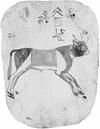- Apis
-
/ay"pis/, n. Egyptian Religion.a sacred bull worshiped at Memphis: identified originally with Ptah and later assimilated with Osiris to form the Ptolemaic Serapis. Also called Hapi, Hap.
* * *
In ancient Egyptian religion, a sacred bull deity worshiped at Memphis.The cult originated at least as early as the 1st dynasty (с 2925–с 2775 BC). Apis was probably at first a fertility god but became associated with Ptah and also with Osiris and Sokaris, gods of the dead. When an Apis bull died, it was buried with great pomp, and the calf that was to be its successor was installed at Memphis. Apis's priests drew omens from the bull's behaviour, and his oracle had a wide reputation. The worship of Serapis (a combination of Osiris and Apis) probably arose at Memphis in the 3rd century BC and became one of the most widespread Oriental cults in the Roman Empire. Apis, bull deity, painted on the bottom of a wooden coffin, c. 700 BC; in the Roemer und ...Bavaria Verlag
Apis, bull deity, painted on the bottom of a wooden coffin, c. 700 BC; in the Roemer und ...Bavaria Verlag* * *
▪ Egyptian godin ancient Egyptian religion, sacred bull deity worshipped at Memphis. The cult of Apis originated at least as early as the 1st dynasty (c. 2925–c. 2775 BCE). Like other bull deities, Apis was probably at first a fertility god concerned with the propagation of grain and herds, but he became associated with Ptah, the paramount deity of the Memphite area, and also with Osiris (as User-Hapi) and Sokaris, gods of the dead and of the underworld. As Apis-Atum he was associated with the solar cult and was often represented with the sun-disk between his horns.Much of what is known about Apis comes from Greco-Roman writers. He was black and white and distinguished by special markings. Some ancient writers said that he was begotten by a ray of light from heaven, and others claimed that he was sired by an Apis bull. When a sacred bull died, the calf that was to be his successor was sought and installed in the Apieion at Memphis. His priests drew omens from his behaviour, and his oracle had a wide reputation. When an Apis bull died, it was buried with great pomp at Ṣaqqārah, in underground galleries known in the classical world as the Serapeum. It was probably in Memphis that the worship of Serapis (after the Greek form Osorapis, a combination of Osiris and Apis in the image of an eastern Greek god) arose under Ptolemy I Soter (305–282 BCE). From Alexandria it spread to become one of the most widespread Eastern cults in the Roman Empire.* * *
Universalium. 2010.
